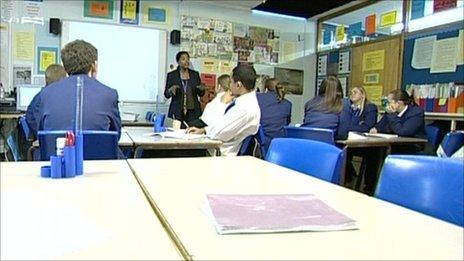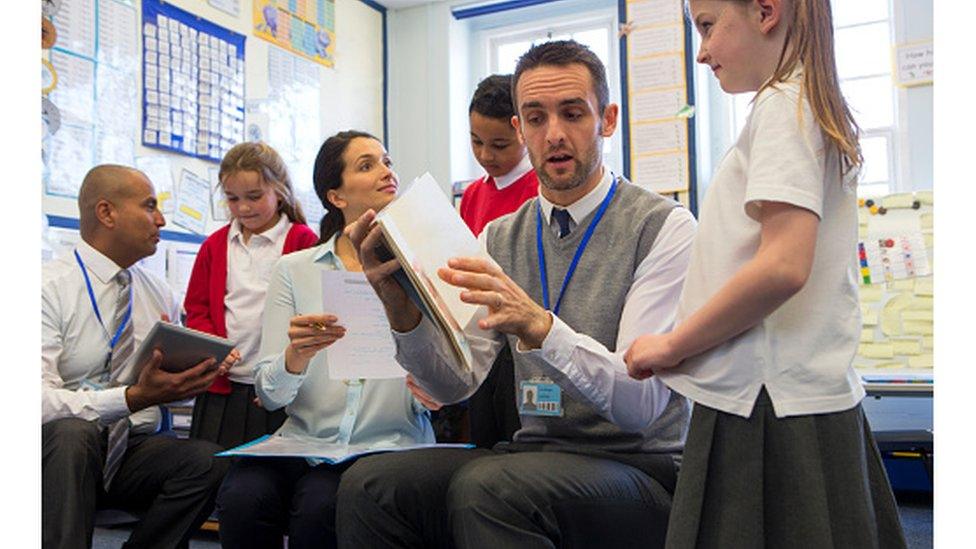Worst-performing primaries in England become academies
- Published
- comments
Michael Gove: "Turning schools into academies has generated fantastic results"
Two hundred of England's worst-performing primary schools will be closed next year and re-opened as academies, the government has said.
Education Secretary Michael Gove says this will force schools which have failed to get their pupils to expected levels in maths and English to improve.
The new academies, taken out of local authority control, will be run by more successful local schools.
The National Union of Teachers said it was an "unacceptable experiment".
In an address to the annual conference of the National College for School Leadership in Birmingham, Mr Gove said 200 primary schools had failed to reach national targets for at least five years.
"These schools have let down repeated cohorts of children," he said.
The government will make it an "urgent priority" to identify new sponsors for these schools, and re-open them in September 2012, he said.
The schools will not be named publicly, but will be approached by the Department for Education in the coming weeks and months.
The department said it would aim to turn a further 500 schools that had failed to reach the so-called "floor targets" in three of the past four years into academies after 2012.
The Education Bill currently being debated in Parliament would give the government the power to "intervene to turn around underperforming schools where authorities are recalcitrant or try to stand in the way of improvement", Mr Gove said.
But he hoped wherever possible to "find solutions that everyone can agree on".
Speaking to the BBC earlier, Mr Gove said academy status was "a tried and tested way" of getting the right head teacher in place to turn a school around.
Headteacher highlights teacher recruitment, salary and training issues
It gives schools increased freedom over staff pay, the curriculum they teach and school opening times.
"What we're seeing through the academy movement is a grassroots change in the way that education is operating in this country - heads are in charge, not politicians."
He added that the change to academy status for the 200 schools meant some head teachers "would go", but others would stay on, with support from leaders from another school.
Mr Gove said that secondary academies that had taken over primary schools had achieved "amazing results".
Becoming academies brought schools a cut in bureaucracy, he added.
Academy status also gives schools control of some funds previously handled by the local authority.
This enables them to extend the school day, run catch-up classes at the weekend or bring in expert psychologists and social workers, Mr Gove said.
He said 88 academies with outside sponsors had been set up in the 2011-12 academic year, bringing the total to 362.
'Confusion and distress'
Under Labour, the academies programme was focused on underperforming schools, but the coalition has widened it to all schools, with an initial focus on those rated "outstanding" by the schools watchdog Ofsted.
The total number of academies has now risen to 704, up from 203 a year ago, with applications submitted by a further 814 schools.
However, there are so far only about 100 primary academies open.
The National Union of Teachers accused Mr Gove of "breathtaking ignorance" in his belief that compelling primary schools to become academies would improve standards.
"The evidence does not support this," said general secretary Christine Blower.
"This is a totally unacceptable experiment to undertake with our primary school children."
"Simply closing schools and replacing them with academies will not have the impact sought but will cause a great deal of confusion and distress for parents, pupils and staff," she said.
The Association of School and College Leaders said it had "grave reservations" about the government's "simplistic approach".
Its general secretary, Brian Lightman, said: "Schools will only improve with the full commitment and buy-in of those who lead them. Takeover threats and perverse incentives do not achieve this. They alienate professionals, not engage them."
Association of Teachers and Lecturers (ATL) deputy general secretary Martin Johnson said Mr Gove was "using draconian powers he has given himself in the Education Bill to run schools from Whitehall".
"Closing and opening schools and finding sponsors for them on this scale will be a logistical nightmare. Once again, Michael Gove is making up policy on the hoof and leaving others to sort out the mess," he said.
But National Association of Head Teachers general secretary Russell Hobby said: "If a school remains far below the floor standards for years, with no sign of improvement, and if it has had good quality support, then of course we need a radical solution."
And Specialist Schools and Academies Trust chief executive Elizabeth Reid said academies set up to replace failing schools had "shown dramatic improvements in many cases".
"The same 'can-do' attitude and drive to succeed which has transformed education in those schools can be transferred to persistently underperforming primary schools," she said.
Floor targets
Mr Gove argues that academies drive up standards, but critics say they risk fragmenting state education by undermining the role of the local authority.
On Wednesday it was revealed Mr Gove wanted to raise the floor target for secondary schools to having to secure five good GCSEs for at least 50% of pupils.
At present a school is assessed as underperforming if fewer than 35% of pupils get five GCSEs at grades A* to C, including maths and English.
For primary schools, the target is 60% of pupils achieving level four in English and maths in the national curriculum tests known as Sats.
Also, for either a primary or a secondary school to be considered underperforming, more pupils than the national average must be failing to make the expected amount of progress in maths and English.
- Published15 June 2011

- Published7 May 2016

- Published17 November 2010
- Published9 May 2011

- Published23 September 2010
- Published24 August 2010